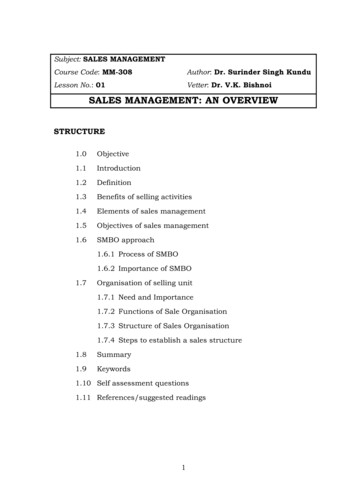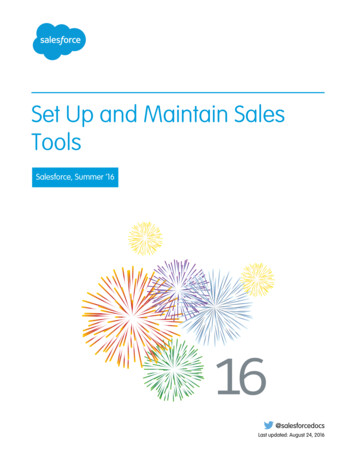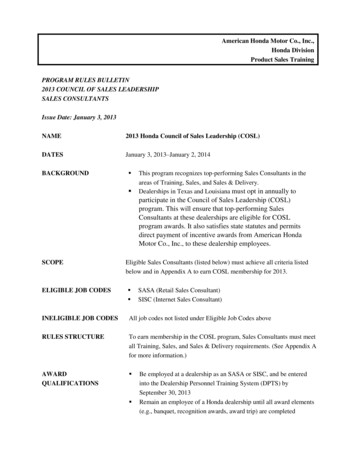
Transcription
Subject: SALES MANAGEMENTCourse Code: MM-308Author: Dr. Surinder Singh KunduLesson No.: 01Vetter: Dr. V.K. BishnoiSALES MANAGEMENT: AN inition1.3Benefits of selling activities1.4Elements of sales management1.5Objectives of sales management1.6SMBO approach1.6.1 Process of SMBO1.6.2 Importance of SMBO1.7Organisation of selling unit1.7.1 Need and Importance1.7.2 Functions of Sale Organisation1.7.3 Structure of Sales Organisation1.7.4 Steps to establish a sales structure1.8Summary1.9Keywords1.10 Self assessment questions1.11 References/suggested readings1
1.0OBJECTIVEAfter going through this lesson, you will be able to-1.1 Discuss the sales, sales management and related concepts. Explain the structure and objectives of a sales organisation.INTRODUCTIONIn daily life, a layman deals with different transaction in terms ofselling and purchasing of goods and services. In these transactions thesecond one persuades the first person. Therefore, selling may be definedas persuading people to satisfy the want of first one. The person, whodoes this act, is called as the salesman, the result of this action as sales,while these activities of the person, are supervised and controlled ivesareprofessionals. They plan, build and maintain effective organisations anddesign and utilize efficient control procedures. The professionalsapproach requires thorough analysis, market-efficient qualitative andquantitative personal-selling strategy. It calls for skilful application oforganisational principles to the conduct of sales operations. In addition,the professional approach demands the ability to install, operate, and usecontrol procedures appropriate to the firm’s situation and its objectives.Executives capable of applying the professional approach to salesmanagement are in high demand today. The quality of selling is referredto as salesmanship. In other words, ‘management’ is synonymous withleadership. Managers do the same thing in industry, as ministers do instates and at the centre, i.e., they have to plan, forecast, direct andcontrol their personnel. Here success lies in running together, hand inhand. Managers are the captains of the army of their followers.2
1.2DEFINITIONOriginally, the term ‘sales management’ referred to the direction ofsales force personnel. But, it has gained a significant position in thetoday’s world. Now, the sales management meant management of allmarketing activities, including advertising, sales promotion, marketingresearch, physical distribution, pricing, and product merchandising. ,takesintoconsideration a number of these viewpoints. Its definitions runs like: theplanning, direction, and control of the personnel, selling activities of abusiness unit including recruiting, selecting, training, assigning, rating,supervising, paying, motivating, as all these tasks apply to the personnelsales-force.Further, it may be quoted: it is a socio-scientific process, involving’group-effort’ in the pursuit of common goals or objectives, which are predetermined. Co-ordination is its key, though, no doubt, it is a system ofauthority, but the emphasis is on harmony and not conflict.Sales-management differs from other fields of management, mainlyin different aspects: the selling operation of a business firm does not existin isolation. Thus, simultaneous with the changes taking place in thebusiness, as well as marketing-orientation, anew concept of salesmanagement has evolved. The business, is now society-oriented, onhuman-welfare aspects. So, sales-management has to work in a broaderand newer environment, in co-existence with the traditional lines. Thepresent emphasis is now on total development of human resources.3
1.3BENEFITS OF SELLING ACTIVITIESThere are different benefits of selling activities, which are asfollows:(1)Benefits to the society: economic growth and maximumemployment are the basics for national development. Theachievement of both these goals means jobs and incomes fora nation’s labour-force. The number of people, who needjobs, continues to expand, and also some jobs are beingeliminated, because of the introduction of computers andabolition of obsolete technology. If jobs are to be madeavailable for all those, who want and expect them, theeconomy must continuously expand its production of goodsand services, which can only be done by adopting soundgovernment-policies and efficient use of people. ent efforts to create and stimulate demand, salespeople could be said to be the life and blood of a productiveeconomic-system. The large number of workers, in factories,and offices, would not be needed, if someone were not sellingtheir products.(2)Benefits to consumers: professional people may not knowevery fact of a product, but they, at least know its majoruses, limitations and benefits; so they can easily serve theircustomers, quite effectively. For exan1ple, an insuranceagent can analyse the hazards and risks that confront a4
coverage and offer helpful advice, in order to eliminate thegaps or overlaps in coverage, in addition to saving the alysetechnical-problems, which may be confronting a particularorganisation and they can give the right recommendationsfor developing efficient operations. Like-wise, the medicalrepresentatives may help the busy doctor, by keeping himabreast of new drugs in the market. The list of sales-peoplewho can offer assistance to customers is practically withoutend.(3)Benefits to business firms; their sales-persons andcustomers: salespersons are owned by their companies,while customers are the end-users of the company’sproduct(s) and/or services, all these people, in the chain ofmarketing, stand to benefit by sales-activities. A businessfirm can be profitable only if its revenues exceed its costs.The prime responsibility of the salespersons is to sell thegoods, produced by the organisation, at a profit. The creativesales-person, tries to penetrate his territory, and adoptssuitable means and techniques of profitable-selling of goodsand/or services. Business firms, derive various other benefitsfrom, non-selling activities of sales-persons. The salesperson, in the field, is an ideal person, to keep the companyabreast, or ahead of competition. He, thus, becomes animportant source of field-intelligence by providing important(and sometimes very crucial) information, about the nature of5
competitive-activities, and also about the changing needs ofcustomers. The sales-force has the additional responsibilityof serving the needs of customers that buy the film’sproduct(s). Most firms cannot survive, only on the basis ofone-time sales; repeat-sales are necessary. This is possibleonly if the customers are served in a professional manner. vities as: providing customers with ‘product-information’and ‘demonstration(s); training customers-employees, inproduct-use; providing customers with sales-advice; andassisting customers in maintaining ‘inventories’.1.4ELEMENTS OF SALES MANAGEMENTThere are the four basic elements of sales management, discussedbelow:(1)Planning: a business cannot be taken as a chance. Everysalespeople or person concerned have to see for the future, ina planned way like what must be done? And who will do it?The plan must be based on extensive market research, andthe facts must be verified at every stage. The plan shouldalso be evaluated, after investigating the total-market, for aparticular type of product. Flexibility must be provided byestablishing a specialists production line, to allow forvariation in production. The plan should also be subject tocontinued review. The details of the plan should bediscussed, with all the departmental heads, concerned, and6
their sub-ordinates, who bear responsibility for fulfilling theirparts of the plan.(2)Co-ordination: Co-ordination is all pervasive and permeatesevery function of the management-process. For example, illplanning, departmental-plans are integrated into a master.Plan, ensuring adequate co-ordination. Similarly, organisingstarts by co-ordination wholly, partially inter-departmentaland inter-personnel matters. Co-ordination also helps inmaximum utilisation of human-effort by the exercise ion,communication etc. The control-system also needs hniques. Nevertheless, there are sound principles, onwhich to develop skills. It has a special need to help the staff,to see the total picture and co-ordinate their activities, withthe rest of the team. The sales manager has to encouragedirect personal-contact, within the organisation, particularlywhere there is lateral-leadership. Harmony, and not discord,should be the guiding mantra. In addition, one has to ensurefree flow of information that is selective to the objectives ofthe business. No personal problems, arising from businessoperations are to be ignored, but solved through a freeexchange of ideas. This is especially true in the case of thesales-force of any organisation.(3)Controlling: the sales manager has to check regularly, thatthe sales activities are moving in the right direction or not.He guides, leads, and motivates the subordinates, so as to7
achieve the goals planned for the business. He has to takesteps to ensure that the activities of the people conform tothe plans and objectives of the organisation. The controllingsystem should be such that one can study the past, note thepitfalls and take corrective measures, so that similarproblems may not occur in the future. The controller has toensure that the set targets, budgets and schedules areattained or followed in letter and spirit. There must beprocedures to bring to light the failure to attain a target. Thecontrol-system has to (i) prepare sales and market forecasts;(ii) determine the level of sales-budget; (iii) determine thesales-quotas for each salesman; (iv) determine, review andselect distribution-channels; (v) organise an efficient salesforce; (vi) establish a system of sales-reporting; (vii) establisha system of statistical sales-credit; (viii) establish stockcontrol system(s); (ix) review of performance of the salesforce; and (x) establish periodical testing programmes. In abig organisation, each salesman is assigned a territory (notso big that it cannot be adequately covered). Each salesmanhas a target, set for specific ‘period. From the weekly andmonthly sales-reports, the control system is established, thatwill prepare records whether a particular salesman isworking efficiently or not.(4)Motivating: Motivation is essentially a human resourceconcept. It aims to weld together distinctive personalities intoan efficient team. For this, knowledge of human psychologyis needed, as a means of understanding behaviour patterns.8
This is especially important in the case of the sales-force.Only motivated sales-persons can achieve company’s goals.1.5OBJECTIVES OF SALES MANAGEMENTEvery business firm has certain objectives to achieve. Theseobjectives may be very explicit and definitive, or they may be implicit orgeneral. Although, firms have different mixes of objectives, and they doplace differing emphasis, on individual ones, the typical objectivesinclude (i) profitability, (ii) sales-volume, (iii) market share, (iv) growth,and (v) corporate-image. While all these objectives are important to abusiness firm, the objectives, relating to sales-volume, market share andprofitability, are greatly affected by the effectiveness and efficiency, withwhich the sales-function is managed.Business firms, have, in fact, found that it is the most effectivemanagement objective of the firm; that must emanate out of its overallbusiness or corporate objectives. The sales-management objectives of abusiness firm, generally relate to the areas of (i) achieving sufficientsales-volume, (ii) providing sufficient profit, and (iii) experiencingcontinuing growth.Generally, objectives of sales-management have to cover varioussales-functions, in an integrated manner. These objectives are to beexpressed, as far as possible, in measurable and quantitative terms, andshould also be realistic and achievable. Since, there are more than oneobjective, these should be put, on a hierarchical manner (mostimportant, down to the least important). To ensure their flawlessrealisation, they must be congruent, i.e., they must fit together, and not9
be in conflict with each other. For example, suppose you ask a salesmanto cut his travelling expenses, and ask him to spend more time, in thefield. To make these two requirements, more meaningful, they must belinked with specific time-element.The setting of objectives should not be based only on the judgmentof the top-management. Rather, it should be formulated and finalised,with the involvement of the sales-force, at the grass-roots level. Inaddition, the process of setting of sales-objectives should begin, only afterthe company has conducted benchmark studies, to find out, as to whereit stands in terms of product, brand and market-sales and market sharetrends (all in measurable terms).1.6SMBO APPROACHIt is another approach to formulate and accomplish sales-objectivesis the sales management by objectives (SMBO) technique. It is formulatedcombined by sales manager and sales-force (representatives). It aims tofocus on (i) results, within a specified set of objectives and (ii)participative style of management.1.6.1 Process of SMBOThe operationalisation of SMBO is a process, comprising of thefollowing steps:(i)Setting goals jointly with the salesman: In this process ltaneously in the o
Subject: SALES MANAGEMENT Course Code: MM-308 Author: Dr. Surinder Singh Kundu Lesson No.: 01 Vetter: Dr. V.K. Bishnoi SALES MANAGEMENT: AN OVERVIEW STRUCTURE 1.0 File Size: 447KBPage Count: 202










